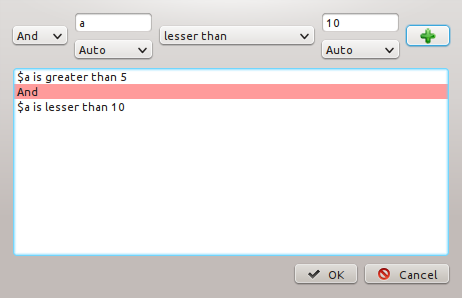Variables are used for storing information inside them. You can think of it like a box, where you store something inside it.
They're useful for storing information you want to preserve as the game procedes.

There are some situations where you need or can use conditions. The {branch} action is one example where you need to use conditions.
If you're not comfortable creating the conditions by yourself, in the {Editor} you can avoid all that by using the condition editor that is available (image at right). For accessing it you just need to double-click the text area where you would write the condition, and the condition dialog will pop-up.
Alternatively you can write the conditions yourself manually. You need to use the following symbols:
- a > b (a is greater than b)
- a < b (a is lesser than b)
- a >= b (a is greater than or equal to b)
- a <= b (a is lesser than or equal to b)
- a == b (a is equal to b)
- a != b (a is different from b)
You can join two or more of the above conditions using the following logical operators:
- c1 and c2, where c1 and c2 can be any of the above conditions.
- c1 or c2, where c1 and c2 can be any of the above conditions.
For using variables within text (for example in a {dialogue}) you need to preceed the variable with a "$" (e.g. $correct). Here's an example:
"You have already $correct correct answers!"
If variable "correct"contains the value "5", this will result in:
"You have already 5 correct answers!"